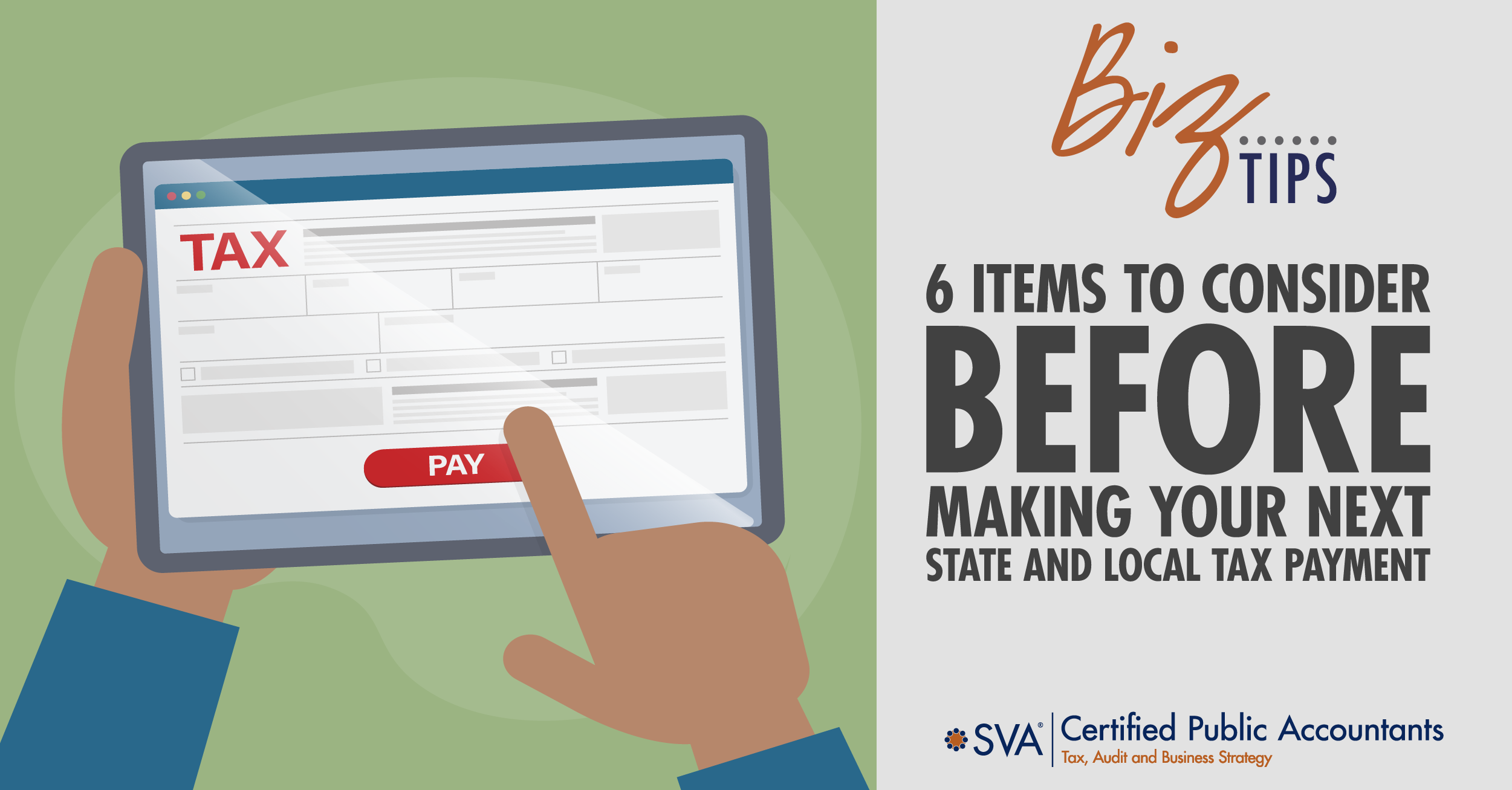In many cases, businesses simply pay state and local taxes without giving them much thought. These taxes are often far less than federal tax obligations, so they are not as intimidating.
However, state and local taxes actually make up a significant portion of a business’s total tax liability, particularly if a company operates in more than one state.
It is often worth the time and effort to re-examine state and local tax obligations to determine if any new tax benefits are available to your business. In addition, new tax responsibilities crop up for businesses from time to time.
As a result, a periodic review of tax requirements will ensure that a company is keeping up with tax obligations, which can often stave off costly penalties and fees.
The deadline for 2023 estimated tax payments is right around the corner. Now is a great time to start reviewing potential credits and deductions and investigate reporting obligations.
Items to Consider
Below are some items that business owners may want to reconsider before making their next quarterly tax payment.
1. The Appropriate Business Nexus
Businesses are generally required to file tax returns in each state in which they have a “nexus.” But they are not required to file in a state where the company does not meet the minimum standards for a business nexus.
Companies sometimes end up filing taxes in states in which they do not need to file, or they miss filing in states where they should file.
Rules in each state vary, but typically, a business will have a nexus in a particular state if one or more of the following apply:
- Temporarily storing inventory at a third-party warehouse
- Presence of mobile or movable property in that state
- Short visits to the state by employees, even if only for a day or two (over each 12-month period)
- Independent contractors making sales or performing services in that state
- Sales of goods or services or conducting financial transactions with customers in that state
Some states also have rules regarding an “economic nexus,” which applies even if a company does not have a physical presence in that state. Check with a tax professional to determine whether your company meets the nexus test for any state for which it might have connections.
2. Public Law 86-272 Protections
Public Law 86-272 is a federal law that allows companies immunity from state and local taxes if certain conditions are met.
Specifically, if the only connection a company has with a state is the solicitation of sales of tangible personal property and that property is shipped from outside the state, the business may not be subject to state and local taxes within that state.
Because of the increase in online sales, PL 86-272 might actually end up being a relatively narrow exception. However, businesses that ship goods out of state may still want to check with their tax advisor about whether this tax “loophole” might apply to their business.
3. Multi-State Apportionment Methods
Apportionment refers to the amount of activity that occurs within each state, usually based on a percentage of total sales or activity. However, allocation and apportionment rules will vary by state, so if the business is using a uniform method to apportion, it is probably paying too little or too much in taxes.
Most states apportion by sales, but not every state uses this method, and several exceptions apply. The company may want to consider the following:
- Is market-based or cost-of-performance sourcing for services or the sale of intangibles required?
- Is non-business income allowed to be allocated?
- Is flow-through apportionment considered for partnership interests? Is such consideration necessary?
- Are gains, interest, or dividends considered as part of the allocation?
- Are any special elections necessary for specific kinds of allocations?
Businesses should take the time to look at each revenue stream to determine sourcing and apportionment. Reviewing the above factors in the context of each state’s apportionment rules could save significant money at tax time.
4. Beneficial Filing Methods for Affiliated Groups
Some states will assess additional taxes based on a business’s filing method. For instance, a unitary business might be required to report income on a combined basis, which might increase taxes overall.
Alternative filing options might be available that are more advantageous. Remember that even a group taxed as affiliated at the federal level might not have to consolidate for a state return.
5. Pass-Through Taxation
Pass-through entities have considerable tax advantages at the federal level, but not every business will qualify for this beneficial tax treatment and not all states follow federal pass-through entity treatment.
In fact, many states have created “workarounds” to the federal $10,000 state and local tax deduction limit for pass-through entity owners by permitting pass-through entities to elect to be taxed at the state level. This type of treatment allows a SALT (state and local tax) deduction where it might not otherwise be available.
6. Transferable Tax Credits
The new Inflation Reduction Act and the CHIPS Act (Creating Helpful Incentives to Produce Semiconductors and Science Act of 2022) have created a few new federal tax credits, and many are transferable. States are also creating similar credit programs that provide tax-level “rewards” for recession preparedness and ESG efforts.
Companies should review these new programs to determine if they qualify for transferable tax credits at the federal and state levels.
Get Tax Help
State and local taxes can be a challenge for many companies. A tax professional can be an excellent resource to determine if your company is taking advantage of all the state and local tax breaks available.
© 2023 CPA ContentPlus

